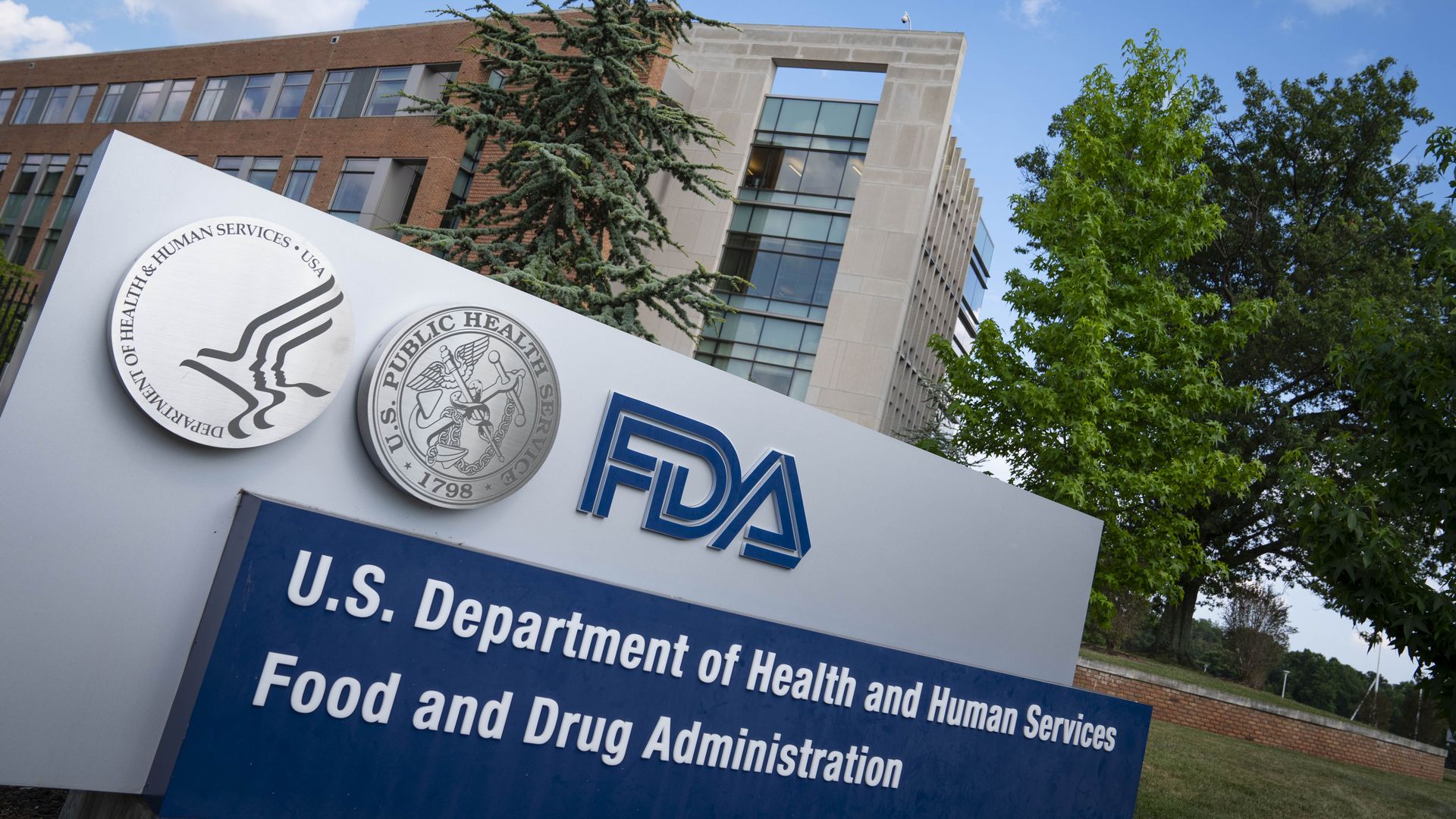| |
| |
| |
| Presented By Partnership for America's Health Care Future |
| |
| Axios Vitals |
| By Tina Reed ·Aug 06, 2021 |
| Good morning, Vitals readers. Today's newsletter is 1,030 words, or a 4-minute read. 🎙 Listen up: This morning, the Axios Today podcast talks about a major HIV outbreak in West Virginia — and why many of the recommended fixes are running up against local laws. Check it out. Situational awareness: Novavax won't seek U.S. approval for its COVID-19 vaccine candidate until the fourth quarter, the company said as it released its second-quarter earnings report. |
| |
| |
| 1 big thing: CDC's booster messaging mess |
 |
|
| Illustration: Sarah Grillo/Axios |
| |
| The Biden administration — already under fire for its handling of masking guidance — is losing control of the narrative surrounding coronavirus vaccine booster shots, Axios' Caitlin Owens writes. Why it matters: The vast majority of vaccinated Americans don't need to worry about their level of protection against the virus, at least not yet. - But the void of information from the federal government about what should be expected going forward is being filled by drug companies, other countries and nervous Americans themselves.
The science increasingly suggests that some people — particularly the immunocompromised — need booster shots. Other vulnerable populations may also need them in the coming months. - Amid all the chatter, some Americans are taking it upon themselves to go and get a booster shot without any official guidance.
- "We're just following. We're not leading, and this is really a problem here. In my sense, we will be moving toward booster shots," said Eric Topol, executive vice president of Scripps Research.
The big picture: Vaccine makers have been making the case for months that boosters will be necessary for at least some people, other countries have begun giving a third round of shots to some populations, and Biden officials are privately saying that boosters are increasingly likely. - However, the public message from the CDC and other federal health officials has been that boosters aren't necessary now. But if they do become necessary, the U.S. has enough doses.
- This may be true, but it's not answering people's increasingly anxious questions about how long they should expect their vaccine protection to last as Delta continues to spread.
- "[The CDC has] lost control of the narrative," said a source close to the administration. "You're seeing people make decisions without looking to their guidance or from other sources."
Go deeper. |
    |
| |
| |
| 2. 📊 Sales snapshot |
 Data: Company filings; Chart: Sara Wise/Axios The four main drug companies making COVID-19 vaccines have sold a combined $18.6 billion worth of the shots in the first half of 2021, Axios' Bob Herman reports. By the numbers: Sales are expected to reach a combined $60 billion by the end of the year. - Pfizer and Moderna have collected more than 90% of global COVID-19 vaccine revenues.
- Pfizer alone accounts for 60% of worldwide sales.
|
    |
| |
| |
| 3. Suppliers hit by PPE glut |
 |
|
| EMTs put on personal protective equipment. Photo: RJ Sangosti/MediaNews Group/The Denver Post via Getty Images |
| |
| McKesson and Cardinal Health are sitting on huge inventories of personal protective equipment, some of which they estimate won't be used or will expire, Bob writes. By the numbers: It will result in a $164 million loss for McKesson and a $197 million loss for Cardinal in the second quarter. Between the lines: Last year, during the height of the pandemic, PPE was in high demand but short supply, leading to high prices and long waits. - Now that supply has caught up, some medical distributors have too much and believe a lot will go unsold, although McKesson said it would donate some of its excess PPE.
|
    |
| |
| |
| A message from Partnership for America's Health Care Future |
| Let's build on what's working, not threaten access to care |
| |
 |
| |
| As some politicians explore creating a new government-controlled health insurance system, research finds the public option could force hospitals to reduce critical services – disproportionately harming underserved communities. See the findings. |
| |
| |
| 4. FDA falls short on heart pump protection |
 |
|
| Photo: Sarah Silbiger/Getty Images |
| |
| Thousands of patients were implanted with heart pumps that the FDA knew could be dangerous, a new ProPublica investigation found. Why it matters: This is the latest question raised about how well the nation's top drug and device regulator protects patients, most recently after the controversial approval of Aduhelm. Driving the news: "As HeartWare and Medtronic failed inspection after inspection and reports of device-related deaths piled up, the FDA relied on the device makers to fix the problems voluntarily," ProPublica's Neil Bedi writes. - The majority of the roughly 19,000 patients with the implant got it after the FDA found problems in 2014.
- By the end of 2020, the FDA received more than 3,000 reports of patient deaths that may have been caused or contributed to by the device.
- "Patients have no idea, and they rely on the FDA to ensure the safety and effectiveness of high-risk devices," said Rita Redberg, a cardiologist at the University of California, San Francisco.
|
    |
| |
| |
| 5. Seven-figure sparring over drug prices |
| Leading drug industry group PhRMA launched a seven-figure ad attack Thursday in the brewing battle over Medicare's ability to negotiate drug prices, saying negotiation would actually take away options from seniors. The other side: PhRMA's ad buy came the same day advocacy group Protect Our Care announced its own seven-figure campaign saying it wanted to "put an end to Big Pharma's rigged system." Be smart: August recess is well known for its ability to make or break legislation as members spend time with their — often angry — constituents. |
    |
| |
| |
| 6. Delta upped the stakes in COVID war |
 |
|
| Illustration: Shoshana Gordon/Axios |
| |
| The dominant Delta variant's ability to efficiently infect people and rapidly grow is enabling the coronavirus to regain its footing in the U.S., Axios' Eileen Drage O'Reilly writes. What's happening: Delta has become "an incredibly efficient spreader from human to human" that binds easier to the cell receptors in the upper airway, replicates more quickly and transmits more readily, NIAID director Anthony Fauci tells Axios. - Julie Fischer, senior technical adviser for global health for CRDF Global, says the pandemic has "entered a new phase" where a higher vaccination rate plus more masking and social distancing in certain areas will be required.
- Ezekiel Emanuel, vice provost for global initiatives at the University of Pennsylvania, stressed the importance at an ISDA briefing Tuesday of good indoor ventilation and using NIOSH-approved masks even in outdoor areas that are crowded.
Yes, but: The timing of Delta is particularly concerning because people are fatigued and schools are about to start, Fischer says. - "Delta changes the dynamic of responding to the pandemic again," Fischer says. "There has been sort of a complacency in the U.S. that children are not at high risk of severe disease," but there have been children becoming severely ill, she said.
|
    |
| |
| |
| 7. Dog of the week |
 |
|
| Maisy. Photo: Lauren Wetzsteon Tufo |
| |
| Meet Maisy, a long-haired mini-dachshund nominated by Lauren Wetzsteon Tufo, a health account supervisor for Edelman in D.C. - Maisy has a disability and has braces on her front legs, but is "full of spunk, love, and joy," Wetzsteon Tufo said.
- She was nominated along with her "sister" Bea, of unknown but adorable breed, who was adopted from South Korea in March. Bea, who has a cleft palate, is "in the running for happiest girl in the world," Wetzsteon Tufo said.
Bea. Photo: Lauren Wetzsteon Tufo |
    |
| |
| |
| A message from Partnership for America's Health Care Future |
| Let's build on what's working, not threaten access to care |
| |
 |
| |
| Americans need lawmakers to build on and improve what's working in health care, not start over by creating a new government-controlled health insurance system like the public option that could threaten access to care for racial and ethnic minorities and rural Americans. Learn more. |
| |
 | | It'll help you deliver employee communications more effectively. | | |











No comments:
Post a Comment